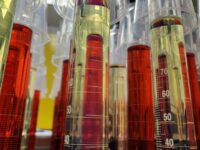This post is about used oil testing for contaminants, one of three basic categories of oil analysis tests. Regarding the importance of this testing, Eurofins TestOil’s Matt McMahon, Oil Analyst III Field Technician, advises, “Generally, the early detection of contaminants provides actionable information to rectify and address issues before significant lubricant degradation and mechanical damage occurs. “
Eurofins TestOil offers four primary tests for evaluating oil contaminants: Water content by Karl Fischer titration, Particle Counting, Elemental Spectroscopy, Glycol (for engine oils) and in certain cases Fourier Transform Infrared Spectroscopy (FTIR).
- Karl Fischer: The Karl Fischer titration test quantifies dissolved, emulsified and free water and is accurate to 0.001%.
- Particle Count: The Pore Blockage Particle Count test quantifies the amount of hard particles present in the sample.
- Elemental Spectroscopy: This detects the presence of elements related to dust/dirt ingression and elements related to cross contamination with other products.
- Glycol: Eurofins TestOil has a specific test for the detection of glycol in engine oils.
- FTIR: measures the amount of specific compounds related to the base stock of the lubricant. It is typically utilized for monitoring fluid health but when there are significant deviations, then fluid contamination is a likely suspect.
Unlike most competitors, in the event of a positive screen for water contamination, Eurofins TestOil will run a Karl Fischer test to precisely quantify the amount of water present in the sample. “The primary reason we implement this is to keep testing costs down and only run Karl Fischer when the sample screens positive for water,” Matt says. “For many machine types, this is sufficient. However, for lubricants and machines sensitive to small quantities of water, we would recommend including Karl Fischer in their scheduled test package.”
It’s important to note that the specific contaminant test that is in alarm can point to very specific maintenance actions and focus. Matt explains, “For example, if the amount of water is high, sources of water ingression should be checked. If the particle count is above the alarm limit, sources of particle ingression such as dirty top off oil (and poor top off oil containers), poor breathers, open hatches, and poor seals should be checked. If nothing is found with regard to ingression, then the filters should be checked/replaced. If elemental spectroscopy or FTIR suggest contamination with another product, check how well lubricants are identified in the plant; what the chances of cross contamination due to poor housekeeping are; and whether machines are properly identified with the proper lubricant in use. Finally, for engines and a positive glycol indication, the engine should be checked for internal coolant leaks.”
For more information on working with Eurofins TestOil for oil analysis and training visit www.testoil.com. Contact: 216-251-2510; sales@testoil.com.
About Eurofins TestOil
With more than 30 years of experience in the oil analysis industry, Eurofins TestOil focuses exclusively on assisting industrial facilities with reducing maintenance costs and avoiding unexpected downtime through oil and fuel analysis program implementation. As industry experts in diagnosing oil-related issues in equipment such as turbines, hydraulics, gearboxes, pumps, compressors and diesel generators, Eurofins TestOil provides customers with same-day turnaround on routine oil analysis testing. For more information on partnering with Eurofins TestOil on oil analysis programs or training opportunities visit https://testoil.com. Contact: Michael Barrett 216-251-2510; sales@testoil.com.
About Eurofins – the global leader in bio-analysis
Eurofins is Testing for Life. Eurofins is the global leader in food, environment, pharmaceutical and cosmetic product testing, and in discovery pharmacology, forensics, advanced material sciences and agroscience Contract Research services. Eurofins is also a market leader in certain testing and laboratory services for genomics, and in the support of clinical studies, as well as in BioPharma Contract Development and Manufacturing. The Group also has a rapidly developing presence in highly specialised and molecular clinical diagnostic testing and in-vitro diagnostic products.
With over 61,000 staff across a network of 940 laboratories in 59 countries, Eurofins’ companies offer a portfolio of over 200,000 analytical methods. Eurofins Shares are listed on Euronext Paris Stock Exchange.


